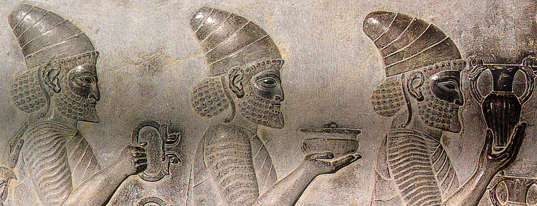Resources

In order to take advantage of the opportunities provided by a vast and well-connected digital environment, the Encyclopædia Iranica project has adopted a more expansive vision, aimed at providing not only original content but also access to other relevant digital resources and projects.
Afghanistan Digital Library: The immediate objective of the Afghanistan Digital Library is to retrieve and restore the first 60 years of Afghanistan’s published cultural heritage. The project is collecting, cataloging, digitizing, and making available over the Internet as many Afghan publications from the period 1871-1930 as it is possible to identify and locate. In addition to books, this will eventually include all published serials, documents, pamphlets, and manuals.
Avestan Digital Archive: The Avestan Digital Archive (ADA) seeks to be a digital archive containing all Avestan manuscripts spread all over the world. The Avesta, the holy book of the Zoroastrian religion, was last edited at the end of the 1890s of the 19th century by the German scholar K. F. Geldner.
Bibliographia Iranica: Despite the existence of a tremendous amount of beneficial research in the field of Iranian studies, no exhaustive bibliography in this research domain is publicly available. Prof. Houchang Chehabi has kindly provided the Iranian Studies Group at MIT with his invaluable Bibliographia Iranica which exceeds 6,000 references.
British Library, Asian and African Studies Blog: The Asian and African Studies blog promotes the work of the curators, recent acquisitions, digitisation projects, and collaborative projects outside the Library.
Digital Nineveh Archives: The UC Berkeley Digital Nineveh Archives was initiated in December 2005, and has been made possible by a grant from the National Endowment for the Humanities initiative, Recovering Iraq’s Past. In December 2007 additional support was provided by the British Universities Iraq Consortium. The project, directed by David Stronach and Eleanor Wilkinson, began digitizing only the field records from the University of California at Berkeley Expedition to Nineveh 1987, 1989 and 1990. It has grown to accommodate knowledge contributed by other archaeologists past, present and future, in what has the potential to be first comprehensive archaeological reckoning of the history of the site, from the 19th century through to today.
Digital Persian Archive: The image database of Persian historical documents from Iran and Central Asia up to the 20th century includes “public” and “private” documents: royal decrees and orders, official correspondence, and sharia court documents, such as contracts of sale and lease, waqf deeds, marriage contracts, and court orders. It also serves as a bibliographic reference tool.
Fihrist: This catalogue provides a searchable interface to basic manuscript descriptions from some of the major manuscript collections in the UK. With the continuing contribution of manuscript records from UK libraries, Fihrist aims to become a union catalogue for manuscripts in Arabic script. Fihrist was created by the OCIMCO project with the support of JISC.
Grierson’s Linguistic Survey of India: A database of G.A. Grierson’s Linguistic Survey of India (1904-1928, Calcutta).
Islamic Manuscripts at Michigan: This site is part of an ongoing project to fully catalogue the Islamic Manuscripts Collection at the University Of Michigan, Ann Arbor. A limited amount of descriptive information has already been gathered for each manuscript and entered in our library catalogue Mirlyn. Concurrently, the manuscripts are being digitized with their digital versions appearing in the Hathi Trust Digital Library (HTDL).
Oxford & Cambridge Islamic Manuscripts Catalogue Online (OCIMCO): The Bodleian and Cambridge University Libraries hold manuscripts of some 10,000 Islamic texts, including many early and rare items. There is currently no electronic access to the Bodleian’s published Islamic manuscript catalogues and several hundred manuscripts can only be accessed through card catalogues. Similarly, while Cambridge University Library has scans of its printed catalogues online, these are not searchable, and a further 399 manuscript descriptions can only be accessed through card catalogues. This pilot project will make available to users in a searchable interface c. 10,000 basic manuscript descriptions taken from printed and card catalogues of the two libraries.
Online Historical Resources for the Study of the Modern History of Bahrain and the Persian Gulf: The Qatar Digital Library (QDL), launched by the British Library-Qatar Foundation Partnership in October 2014, contains a huge — and growing — number of British colonial documents related to the history of the Persian Gulf and broader Middle East from the 18th to 20th Century, all of which are now freely available to search and download.
Persian Literature in Translation: Persian Literature in Translation is a website published by the Packard Humanities Institute. The website contains dozens of Persian texts in translation as well as several digitized secondary sources on Persian literature. The texts can be browsed by author or title and each Persian author is introduced with a short bibliography. Persian titles are available in translation and can be read using a HTML browser. Over 100 works are already available in full-text. The website requires a Java-enabled browser.
Shahnama Project : This site brings you a comprehensive collection of manuscripts of the Shahnama and a display of the miniature paintings in each one. There are currently 502 manuscripts and single pages recorded, 10,380 records of paintings, and 6,275 images from all over the world, now accessible with a few clicks of a mouse.
Wellcome Arabic Manuscript Cataloguing Partnership: The Wellcome Library, Bibliotheca Alexandrina and King’s College, London have formed a partnership to create a free searchable on-line catalogue of 500 Islamic manuscripts in the Wellcome Library. A cataloguing system will be designed to create and manage descriptive metadata for Asian manuscripts, as well as a website to enable sophisticated access to the metadata and images.
Women’s Worlds in Qajar Iran: Women’s World in Qajar Iran is a digital archive supported by Harvard University. It consists of textual, oral, and visual materials related to the lives of women during the Qajar era (1796-1925). The goal of WWIQ is to identify, select, digitize, and make public relevant materials found mostly in private collections.
Updated August 2020

